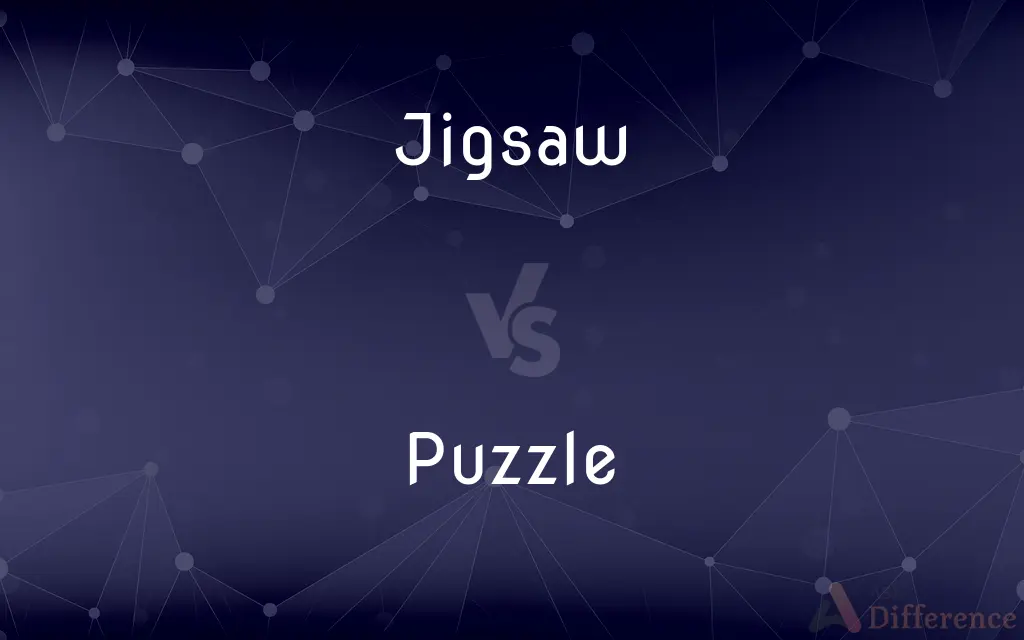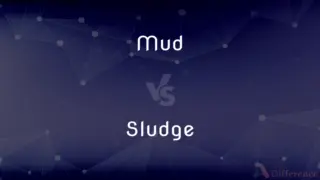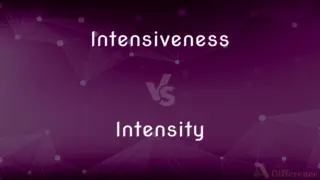Jigsaw vs. Puzzle — What's the Difference?
Edited by Tayyaba Rehman — By Urooj Arif — Updated on April 21, 2024
A jigsaw is a type of puzzle consisting of many interlocking pieces that, when assembled, form a complete picture, while the term "puzzle" refers broadly to any game, problem, or toy that tests a person's ingenuity or knowledge.

Difference Between Jigsaw and Puzzle
Table of Contents
ADVERTISEMENT
Key Differences
Jigsaws are specifically designed puzzles that require assembling oddly shaped interlocking pieces into a coherent image, often based on a printed picture. In contrast, puzzles can encompass a wide range of activities from crossword puzzles and Sudoku to mechanical brain teasers.
A jigsaw puzzle is typically made of cardboard or wood and features a complex image that guides the assembly process, whereas puzzles might not necessarily have a visual component and can include abstract or numerical challenges.
Jigsaws serve both as a form of leisure and a way to enhance spatial reasoning and cognitive skills, engaging users in visual-perceptual tasks. Meanwhile, puzzles cover a broader spectrum, often designed to test and improve various cognitive abilities including logic, mathematics, and language.
The enjoyment of jigsaws comes from the satisfaction of piece placement and the visual completion of a familiar image, while puzzles might offer intellectual satisfaction from solving a problem or discovering a solution through abstract reasoning.
While jigsaw puzzles are a distinct and identifiable type of puzzle, often enjoyed in a group or as a meditative solo activity, the category of puzzles includes many types that can be suited for quick solo challenges or long-term cooperative problem-solving.
ADVERTISEMENT
Comparison Chart
Definition
A puzzle consisting of interlocking pieces forming a picture
A broad category of games testing ingenuity
Composition
Cardboard or wood pieces
Can be composed of any material (paper, metal, digital)
Purpose
To assemble a picture
To solve a problem or challenge
Types
Only interlocking pieces
Includes crosswords, Sudoku, riddles, etc.
Cognitive Skills
Spatial reasoning, visual perception
Logic, math, language, reasoning skills
Compare with Definitions
Jigsaw
A method for improving visual and spatial reasoning.
Jigsaw puzzles are often recommended to enhance spatial reasoning skills in young children.
Puzzle
Any set of problems or challenges that require ingenuity and insight to solve.
The escape room offered a series of puzzles that needed to be solved within an hour.
Jigsaw
A recreational activity involving the construction of a complete image from pieces.
Completing the jigsaw provided a relaxing break from her studies.
Puzzle
An intellectual challenge that may have one or multiple solutions.
The math puzzle stumped everyone in the class until the teacher revealed a clever trick.
Jigsaw
A puzzle made by cutting a picture into irregularly shaped pieces that are to be fitted together.
They spent the evening working on a 1000-piece jigsaw of the New York City skyline.
Puzzle
A category of toys designed to test a variety of cognitive skills.
Educational toys for toddlers often include simple puzzles that teach shapes and colors.
Jigsaw
A game or toy that challenges the assembly of often complex and interlocking pieces.
The children received a jigsaw of a world map to help them learn geography.
Puzzle
Games that involve logical thinking, pattern recognition, or problem-solving skills.
She enjoys puzzles like Sudoku and crosswords as a morning mental workout.
Jigsaw
A tool for cognitive enhancement through the practice of piecing together parts to form a whole.
He used jigsaw puzzles to improve his attention to detail and patience.
Puzzle
A form of entertainment that can be either a solitary or group activity.
The party featured a puzzle competition, challenging teams to solve complex riddles.
Jigsaw
A usually power-driven saw with a narrow vertical blade, used to cut sharp curves.
Puzzle
A puzzle is a game, problem, or toy that tests a person's ingenuity or knowledge. In a puzzle, the solver is expected to put pieces together in a logical way, in order to arrive at the correct or fun solution of the puzzle.
Jigsaw
To cut or form with a jigsaw.
Puzzle
Something, such as a game, toy, or problem, that requires ingenuity and often persistence in solving or assembling.
Jigsaw
To arrange intricately; interlock.
Puzzle
Something that baffles or confuses; an enigma
The puzzle of the author's true identity.
Jigsaw
A power saw with fine teeth and a narrow blade which can cut curves in wood or metal.
Puzzle
The condition of being perplexed; bewilderment
I'm really in a puzzle over how this happened.
Jigsaw
A jigsaw puzzle.
Puzzle
To baffle or confuse mentally by presenting or being a difficult problem or matter.
Jigsaw
Something that can be compared to a jigsaw puzzle.
Puzzle
To clarify or solve (something confusing) by reasoning or study
He puzzled out the significance of the statement.
Jigsaw
(transitive) To cut something using a jigsaw.
Puzzle
To be perplexed.
Jigsaw
A portable power saw with a reciprocating blade; can be used with a variety of blades depending on the application and kind of cut; generally have a plate that rides on the surface that is being cut
Puzzle
To ponder over a problem in an effort to solve or understand it.
Jigsaw
Fine-toothed power saw with a narrow blade; used to cut curved outlines
Puzzle
Anything that is difficult to understand or make sense of.
Where he went after he left the house is a puzzle.
Puzzle
A game for one or more people that is more or less difficult to work out or complete.
Puzzle
A crossword puzzle.
Puzzle
A jigsaw puzzle.
Puzzle
A riddle.
Puzzle
(archaic) Something made with marvellous skill; something of ingenious construction.
Puzzle
The state of being puzzled; perplexity.
To be in a puzzle
Puzzle
(transitive) To perplex, confuse, or mystify; to cause (someone) to be faced with a mystery, without answers or an explanation.
Puzzle
(intransitive) To think long and carefully, in bewilderment.
We puzzled over the curious-shaped lock, but were unable to discover how the key should be inserted.
Puzzle
(transitive) To make intricate; to entangle.
Puzzle
Something which perplexes or embarrasses; especially, a toy or a problem contrived for testing ingenuity; also, something exhibiting marvelous skill in making.
Puzzle
The state of being puzzled; perplexity; as, to be in a puzzle.
Puzzle
To perplex; to confuse; to embarrass; to put to a stand; to nonplus.
A very shrewd disputant in those points is dexterous in puzzling others.
He is perpetually puzzled and perplexed amidst his own blunders.
Puzzle
To make intricate; to entangle.
They disentangle from the puzzled skein.
The ways of Heaven are dark and intricate,Puzzled in mazes, and perplexed with error.
Puzzle
To solve by ingenuity, as a puzzle; - followed by out; as, to puzzle out a mystery.
Puzzle
To be bewildered, or perplexed.
A puzzling fool, that heeds nothing.
Puzzle
To work, as at a puzzle; as, to puzzle over a problem.
Puzzle
A particularly baffling problem that is said to have a correct solution;
He loved to solve chessmate puzzles
That's a real puzzler
Puzzle
A toy that tests your ingenuity
Puzzle
Be a mystery or bewildering to;
This beats me!
Got me--I don't know the answer!
A vexing problem
This question really stuck me
Puzzle
Be uncertain about; think about without fully understanding or being able to decide;
We puzzled over her sudden departure
Common Curiosities
Can puzzles help with educational development?
Yes, puzzles can enhance critical thinking, patience, focus, and a variety of specific educational skills depending on the type of puzzle.
Is there a difference in cognitive benefits between jigsaw puzzles and other types of puzzles?
Yes, jigsaw puzzles specifically improve visual and spatial reasoning, while other puzzles might focus more on mathematical, logical, or verbal skills.
Can doing puzzles help prevent age-related cognitive decline?
Engaging in puzzles is believed to help keep the mind active and may delay the onset of cognitive decline.
What are the benefits of doing jigsaw puzzles?
They improve visual-spatial reasoning, enhance problem-solving skills, and can be a meditative, stress-reducing activity.
How do I choose the right puzzle for my skill level?
Consider the complexity of the puzzle and your previous experience with similar puzzles; start easier and gradually challenge yourself with more difficult puzzles.
What materials are puzzles made from?
Puzzles can be made from many materials, including paper, cardboard, wood, plastic, and metal.
What is the most difficult type of puzzle?
Difficulty is subjective and varies by individual; however, some high-complexity mechanical or 3D puzzles are generally considered challenging.
What is the largest jigsaw puzzle ever made?
As of my last update, the largest jigsaw puzzle was created by Kodak and consisted of 51,300 pieces.
Are jigsaw puzzles suitable for all ages?
Yes, jigsaws come in varying degrees of difficulty, suitable for different age groups from young children to adults.
Are there digital versions of jigsaw puzzles?
Yes, digital jigsaw puzzles are available on various platforms, allowing for adjustable complexity and not requiring physical space.
How do I solve a particularly difficult puzzle?
Break the problem down into smaller parts, approach it from different angles, and don't hesitate to take breaks and return with a fresh perspective.
How can puzzles be incorporated into learning?
Puzzles can be used in educational settings to make learning interactive and to reinforce concepts in a fun and engaging way.
What strategies can improve my puzzle-solving skills?
Practice regularly, study patterns and techniques, and learn from each puzzle-solving experience to improve efficiency and speed.
Are there competitive puzzle-solving events?
Yes, there are competitions for various types of puzzles, including jigsaw puzzle championships and speed-solving contests for games like the Rubik's Cube.
How often should I do puzzles to benefit my brain?
Regular engagement with puzzles can help maintain cognitive sharpness, but the frequency can vary based on personal preference and lifestyle.
Share Your Discovery

Previous Comparison
Mud vs. Sludge
Next Comparison
Intensiveness vs. IntensityAuthor Spotlight
Written by
Urooj ArifUrooj is a skilled content writer at Ask Difference, known for her exceptional ability to simplify complex topics into engaging and informative content. With a passion for research and a flair for clear, concise writing, she consistently delivers articles that resonate with our diverse audience.
Edited by
Tayyaba RehmanTayyaba Rehman is a distinguished writer, currently serving as a primary contributor to askdifference.com. As a researcher in semantics and etymology, Tayyaba's passion for the complexity of languages and their distinctions has found a perfect home on the platform. Tayyaba delves into the intricacies of language, distinguishing between commonly confused words and phrases, thereby providing clarity for readers worldwide.














































